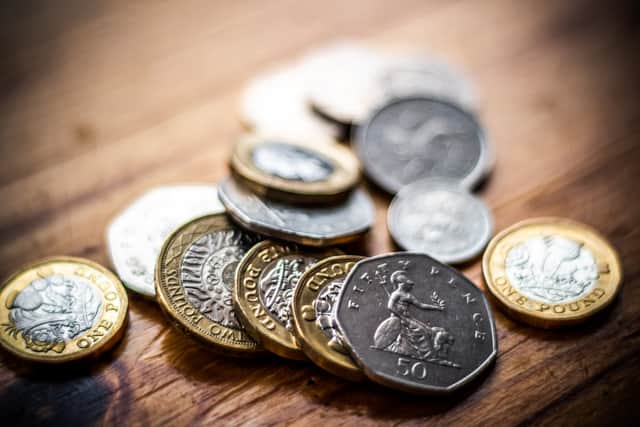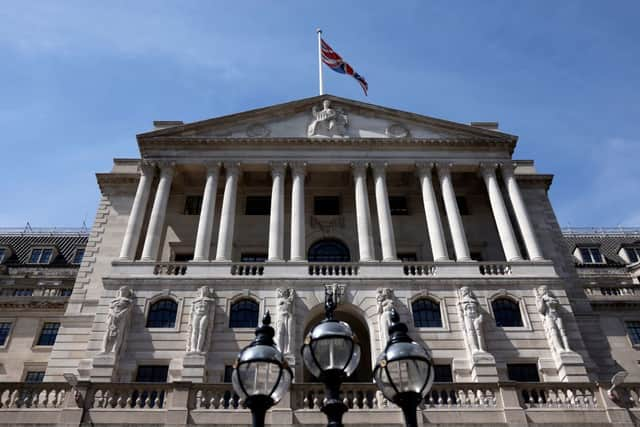Pound exchange rate: how GBP compares to dollar and euro - UK currency value explained as Liz Truss resigns
and live on Freeview channel 276
Liz Truss’s resignation as Prime Minister after just 45 days in office brings to an end not only the shortest premiership in UK policial history, but one of the most tumultuous.
Her mini budget, which was brimming full of unfunded tax cuts, created turmoil on the markets. The pound fell to record lows against the dollar, the cost of public borrowing rose massively and the Bank of England was forced to intervene to prevent a run on pension funds.
Advertisement
Hide AdAdvertisement
Hide AdAfter a series of humiliating u-turns, Truss sacked her Chancellor Kwasi Kwarteng in an apparent bid to shift the blame for the policies. But the move only hastened her departure, as Jeremy Hunt scrapped almost her entire economic agenda upon becoming Chancellor.
With the sacking of Home Secretary Suella Braverman and chaos at a vote on fracking, Conservative MPs forced Truss to fall on her sword on Thursday (20 October). The pound rose in the immediate aftermath of her Downing Street resignation speech.
So, how does the pound currently compare to other major currencies - and why are such comparisons important? Here’s what you need to know.


Why is pound dollar exchange rate so important?
The pound’s value compared to the dollar is important because the dollar is the world’s biggest currency. USD is known as the globe’s ‘primary reserve currency’, which means substantial quantities of it are held by central banks and other financial institutions across the world for international transactions.
Advertisement
Hide AdAdvertisement
Hide AdUntil the middle of the 20th century, pound sterling was the primary reserve. While the pound is still classed as a reserve currency, it sits behind the euro and the yen in terms of how much of it is held, and therefore used, abroad.


Given the dollar is the world’s biggest currency, it is used to determine the price of most key goods and services traded on the international market. For example, wholesale oil and gas prices are in dollars.
So, if the value of the pound drops against the dollar, it means our energy bills and the price of a tank of petrol are likely to go up. Likewise, if the pound loses value against the euro - Eurozone countries being a source of many UK imports, particularly food (for which the UK is a net importer) - prices will go up across many different product categories.
What is the pound exchange rate?
The pound’s exchange rate did not make pretty reading during Liz Truss’s time in office. The fact that it was (and still is) struggling against the other major reserve currencies was an indication from investors that they did not have faith in Truss’s stewardship of the UK economy.
Loading....
Advertisement
Hide AdAdvertisement
Hide AdWhile the mini budget spooked investors, several other factors have been at play including the strength of the US economy - the euro is also at a 20-year low versus the dollar - and how high UK inflation is compared to other countries. Markets believed this latter issue was only set to get worse as a result of Kwasi Kwarteng’s tax cuts, and were calmed when Jeremy Hunt scrapped most of them.
Another issue, according to John R. Bryson, professor of enterprise and economic geography at the University of Birmingham, had been the Bank of England’s reaction to the crisis. He said it looked to the markets as if the central bank was “firefighting” rather than unertaking “strategic economic planning.”
In another damning indictment of how Truss was viewed by investors, the pound initially rose by almost 1% when she announced her resignation. Usually, when an incumbent party or leader could be removed from power, the pound falls in value.
"We've also seen long dated UK gilt yields also fall, with the benchmark 10yr yield falling around 0.2% to around 3.8%. That in itself is a strong message. Normally markets hate market uncertainty and the removal of a sitting Prime Minister would be taken negatively. The fact its been seen as positive tells you all you need to know about the market's attitude towards the Truss premiership,” said Joshua Raymond, director of online investment platform XTB.com.
Advertisement
Hide AdAdvertisement
Hide Ad“The markets have now seen off a complete change in leadership of both No 10 and the UK treasury in just a matter of days. That is remarkable. Investor eyes now switch firmly to who takes over as the new PM and the fact it will only take a week is helpful to remove longer term uncertainty. The focus now shifts on who takes over."
Loading....
Here is how the pound is currently faring in comparison to other major currencies. Data has been taken from Bloomberg at 5pm on Thursday 20 October and is only an indication of where the markets currently are:
- Pound to dollar = 1.1276 (up 0.46% on start of day - a dollar is worth 89p)
- Pound to euro = 1.1484 (up 0.03% - a euro is worth 87p)
- Pound to yen = 168.8180 (up 0.38% - 1 yen is worth 0.6p)
- Pound to rupee = 92.7500 (down 0.96% - 1 rupee is worth 1p)
- Pound to Australian dollar = 1.7818 (down 0.42% - an Australian dollar is worth 56p)
In early trading on the Asian markets on 26 September, the pound briefly fell to an all-time low against the dollar of $1.0327 before rallying slightly.
At the start of the year, the pound was worth $1.35, but the currency has been on a downward curve pretty much ever since.
Comment Guidelines
National World encourages reader discussion on our stories. User feedback, insights and back-and-forth exchanges add a rich layer of context to reporting. Please review our Community Guidelines before commenting.
